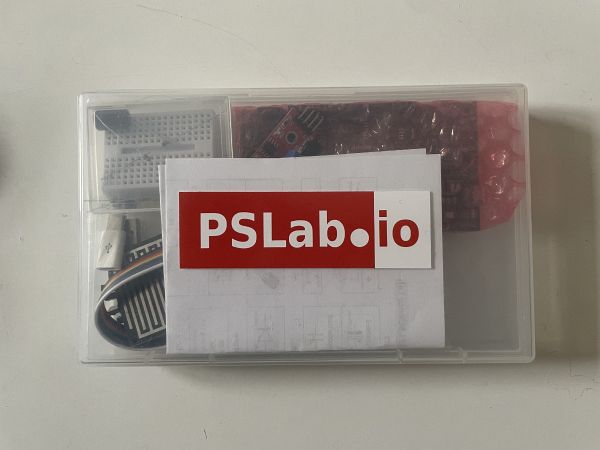Workshop Pocket Science Lab (PSLab): Measurements and Robot Controls
Date: 28 Jan and 29 Jan 2023
Time: 10.00 - 16.00 and 11.00 - 13.00
Location: M7b Room 204, Weimar
Trainers: Marco Antonio Gutierrez, Mario Behling
The goal of this workshop is to introduce students to the PSLab and to enable them to conduct experiments using sensors as well as to control small servos of mini robots.
Prerequisite: Basic understanding of commandline preferred. For beginners a sample Python code file will be provided, that they can use with the device. Note: Please bring your laptop with Python pre-installed. Also recommended: Android phone.
Requirements
- Laptop with Linux (Mac, Windows PC to be confirmed)
- Installed Python version?
Program
Part 1: Introduction to PSLab
The Open Source PSLab board is a small USB powered hardware extension for your Android phone or PC that adds additional sensor capabilities to your phone and enables you to connect to possibly hundreds of available sensors. You will learn how to measure using the built-in components, e.g. the Oscilloscope, or to connect the relevant pins to sensors and start measuring. You can use the PSLab apps to view and collect the data. All sensors following the I²C are compatible and it works without the need for programming.
Part 2: Sensor experiments
In this part we will start with learning how to connect sensors to the PSLab and collect data using the Python library. Python is a powerful programming language that is suitable for beginners. Students will learn how to set up PSLab Python and connect the device to their PC. Sensors to be discussed will be able to collect data on the following:
- measuring temperature
- measuring the O2 content in gases
- measuring the CO2 content in gases
- measuring humidity
Part 3: Servo control with PSLab Python
In this part participants will learn how to initially program and manipulate things with this robot using the Pocket Science Lab board and a laptop. At the end participants will be able to control servos of a robot manipulator with 4 degrees of freedom. We will start with an introduction to basic robotics and specifically to kinematics. We will showcase possible robot designs using an open laser cut wood design, a PSLab (Pocket Science Lab) and a laptop with our own Python script. Extra steps for further exploration will be given. So participants can continue their learning journey after the workshop is done.
Trainers
Marco Antonio Gutierrez
Marco A. Gutiérrez is head of AI and Chief Data Scientist at UpCode Academy. He holds a PhD in cognitive vision planning for robotics systems. His team (Ursus) was awarded with Best Team for Functionality Benchmark on Object Perception and Speech Understanding at the Rocking Robot Challenge 2014. He has contributed to several open-source robotics and AI related projects like RoboComp and the Point Cloud Library as organization administrator and mentor for several editions of the Google Summer of Code programme. His areas of interest include cognitive vision, deep neural networks, AI and embedded systems. Pic: https://www.flickr.com/photos/comprock/40429478583/in/album-72157707607961794/
Mario Behling
Mario Behling is the CEO of OpnTec. He is a technologist with 15 years of experience in leading international development teams in Europe, South-East-Asia and India. He helped to get FOSSASIA started and works with the community on Open Hardware solutions like Pocket Science Lab. Mario is also fascinated about drums and global music and has an interest in architecture. In Vietnam he designed and built a seven storey eco-hotel and in Afghanistan he set up mesh networks in Afghan schools.
